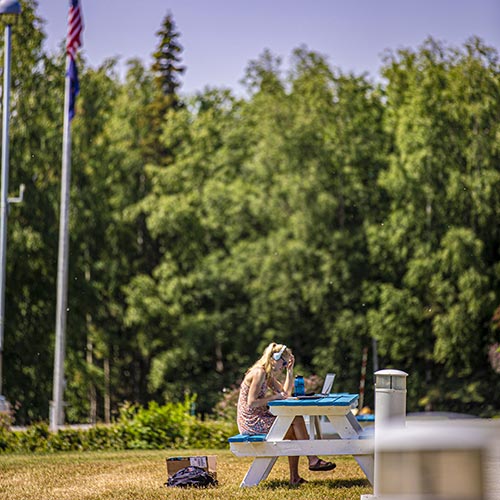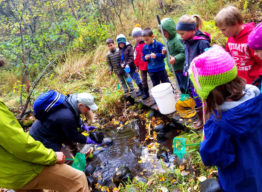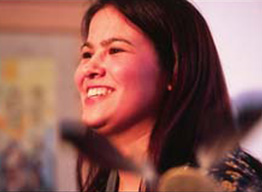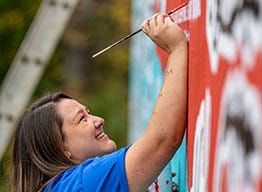Overview
The 2024 Summer Reading Series
Hosted by the low-residency MFA in Creative Writing at Alaska Pacific University, the series will be held on campus in the lecture hall of the Carr-Gottstein Building at 7pm, on various evenings from Sunday, July 14 – Tuesday, July 23.
As the final event of most days of the summer on-campus residency of the MFA program, all readings are free and open to the public.
Location: Carr-Gottstein is the second building on the left, after you ascend the hill onto campus—a purple-pink building with big windows. Parking can be found on the left after passing the building.
4225 University Drive, Anchorage AK, 99508
Event Schedule
We will kick off the reading series with an evening with Nancy Lord:
- 7:00pm – Dessert Reception hosted by the Alaska Center for the Book
- 7:30pm – Contributions to Literacy in Alaska (CLIA) awards ceremony
- 7:45pm – Reading with Nancy Lord
CLIA Awards
The CLIA awards are presented annually by Alaska Center for the Book, Alaska’s liaison with the U.S. Library of Congress Center for the Book. Since 1993, the awards have been presented to more than 100 people and institutions making a significant contribution in literacy, the literary arts, or the preservation of the written or spoken word.
Honorees in 2024 are the Reading Mentors Program of the Talkeetna Friends of the Library; the Anchorage Daily News; and authors Ann Fienup-Riordan, Alice Rearden, and Marie Meade.
The Reading Mentors Program is supported by Friends of the Talkeetna Library, in collaboration with Talkeetna Elementary School, area homeschool families, Sunshine Transit, Upper Susitna Food Pantry, and Talkeetna Library. Teachers identify students who could benefit from additional reading practice. They engage in one-on-one reading sessions with community volunteers after school.
Authors Ann Fienup-Riordan, Alice Rearden, and Marie Meade form another collaboration meriting CLIA awards. The three are tradition-bearers, educators, authors, and translators sharing Yupik culture, tradition, and language. Working sometimes separately, but often with one another, their work is so interwoven that the CLIA awards committee chose to recognize all three, rather than one.
Anchorage Daily News was awarded a CLIA for stepping beyond the usual mission of print and on-line journalism, promoting literacy and literary arts in Alaska. In addition to news coverage, the paper has co-sponsored the statewide UAA/Anchorage Daily News Creative Writing Contest for 41 years. Two past winners have become State Writer Laureates, and several have become published authors. The paper also hosts the annual Alaska State Spelling Bee, Alaska’s Educator of the Year Program, and provides newspapers and curriculum to students through its Newspapers in the Schools.
From July 15 – July 23, we will be hosting six more readings at 7pm with local poets and writers.
- Monday, July 15 – Martha Amore, Katja Perat, John Messick
- Tuesday, July 16 – Sharon Emmerichs, Jamey Bradbury, Seta Kabranian-Melkonian
- Thursday, July 18 – Marc Cameron, Matthew Komatsu, Ray Ball
- Friday, July 19 – Kim Rich, Emily Tallman, Chaun Ballard
- Saturday, July 20 – Tara Ballard, Corinna Cook, Mary Odden
- Tuesday, July 23 – Kisten Anderson, David Scheel
On Wednesday, July 17, at 10am, we will be hosting Yaari Walker, who will be telling traditional stories and reading from her new book, Aatak Ayguumun Angwaaghnaqi: Keep Paddling Against the Wind.
This event is also free and open to the public.
Degree Fit
The Master of Fine Arts is a 36-credit program of individualized, mentor-directed studies with three summer terms, each inclusive of a low-residency requirement. The program includes three areas of study: Fiction, Literary Nonfiction, and Poetry.
Over the course of two years and three summers, students gain a comprehensive understanding of their chosen genre (fiction, literary nonfiction, poetry) along with their place among the notable writers who have gone before them. Fall and Spring semesters in the program involve one-on-one, mentor-directed study plans, advancing individual writing goals. As they work through individualized study plans, students hone their craft with the goal of producing publishable works.
Summer residencies—approximately 2 weeks in length, and introduced by online learning sessions—are comprised of workshops, seminars, lectures, panels, and readings. Through residencies on APU’s campus, the program strives to honor the Dena’ina people and their traditional lands upon which APU sits, as well as Alaska Native storytelling traditions that have thrived and continue to inspire.
The academic year for the Low-Residency MFA begins every Summer Session. Incoming students enroll in 5 credits of Graduate Writer’s Workshop in their genre and begin pre-residency online instruction in May, in preparation for the on-campus residency in July.
Summer Session Online Schedule Framework: Mon., May 6 – Fri., July 12, 2024
Summer On-Campus Residency Schedule Framework: Sat., July 13 – Wed., July 24, 2024
Summer Residency, July 2023 Master Schedule
APU Summer Reading Series 2023

https://www.creativewritingedu.org/
The cost per credit hour for graduate programs is $650 per credit hour. Mandatory fees are $410/year.
For more information, please visit: https://www.alaskapacific.edu/admissions/costs/
Faculty
 David Onofrychuk
David Onofrychuk
Program Director
 Chaun Ballard
Chaun Ballard
Poetry
 Corinna Cook
Corinna Cook
Literary Nonfiction
 Jamey Bradbury
Jamey Bradbury
Fiction
Career Outcomes

- Doctorate Program
- Writing Instructor
- Freelance Writer and/or Editor
Degree Roadmap
Year 1
|
COURSE |
CREDIT HOURS |
|
CRWR 60100-60300: Graduate Writer’s Workshop |
5 |
|
CRWR 60500: Form & Theory: Fall Mentorship |
5 |
|
CRWR 60500: Form & Theory: Spring Mentorship |
5 |
Year 2
|
COURSE |
CREDIT HOURS |
|
CRWR 60100-60300: Graduate Writer’s Workshop: Summer Residency II |
5 |
|
CRWR 60500: Form & Theory: Fall Mentorship |
5 |
|
CRWR 69900: Thesis |
5 |
Year 3
|
COURSE |
CREDIT HOURS |
|
CRWR 69900 Thesis |
3 |
|
CRWR 60400 Thesis Writer’s Workshop Summer Residency 3 |
3 |
CRWR 60100 – Graduate Writer’s Workshop – Fiction
As a hybrid course for MFA students with a focus on Fiction, the Graduate Writer’s Workshop will begin with weekly online meetings at the start of the summer session and culminate in a 12-day Summer Residency on campus. Online, students will gather with their Fiction peers and submit short creative works in response to writing prompts, and analyze the assigned readings in group discussions. At the residency, students will attend daily workshops in their genre, as well as lectures, seminars, and panels given by faculty mentors across genres. A typical day of instruction ends with a reading given by the faculty, open to the community. Over the course of this residency period, students are required to attend all sessions. In-person participation at the residency is mandatory; students cannot complete this requirement online or by independent study.
Prerequisite: Admission into the MFA Program
Offered: Annually
CRWR 60200 – Graduate Writer’s Workshop – Literary Nonfiction
As a hybrid course for MFA students with a focus on Nonfiction, the Graduate Writer’s Workshop will begin with weekly online meetings at the start of the summer session and culminate in a 12-day Summer Residency on campus. Online, students will gather with their Nonfiction peers and submit short creative works in response to writing prompts, and analyze the assigned readings in group discussions. At the residency, students will attend daily workshops in their genre, as well as lectures, seminars, and panels given by faculty mentors across genres. A typical day of instruction ends with a reading given by the faculty, open to the community. Over the course of this residency period, students are required to attend all sessions. In-person participation at the residency is mandatory; students cannot complete this requirement online or by independent study.
Prerequisite: Admission into the MFA Program
Offered: Annually
CRWR 60300 – Graduate Writer’s Workshop – Poetry
As a hybrid course for MFA students with a focus on Poetry, the Graduate Writer’s Workshop will begin with weekly online meetings at the start of the summer session and culminate in a 12-day Summer Residency on campus. Online, students will gather with their Poetry peers and submit short creative works in response to writing prompts, and analyze the assigned readings in group discussions. At the residency, students will attend daily workshops in their genre, as well as lectures, seminars, and panels given by faculty mentors across genres. A typical day of instruction ends with a reading given by the faculty, open to the community. Over the course of this residency period, students are required to attend all sessions. In-person participation at the residency is mandatory; students cannot complete this requirement online or by independent study.
Prerequisite: Admission into the MFA Program
Offered: Annually
CRWR 60500 – Form and Theory
In contact with their faculty mentor throughout the semester, students will submit new creative work and revise previously submitted work in consideration of faculty feedback. The form of this creative work should be directed by observations of the theory informing the elements of craft in published works of interest. With this in mind, students will conduct a critical analysis of each of the full-length works on their reading list, decided upon in discussion with their mentor prior to the start of the semester. Students will complete an annotation for each of these works, to be compiled later in the annotated bibliography segment of the thesis.
Prerequisite: CRWR 60100-60300, Graduate Writer’s Workshop
CRWR 69900 – Thesis
Students will work one-on-one with their mentors near the end of their studies in the program for the express purpose of completing their thesis. A completed thesis is composed of three parts: creative work (100 to 200 pages for fiction or literary nonfiction, and 48 to 64 pages of poetry); a research-focused craft essay (20-40 pages); annotated bibliography (between 40 and 70 books). Students will enroll in thesis credits for the spring semester prior to their third and final summer residency. In the summer session of this final residency, students will not join their peers for the online instruction period beforehand; instead, they will enroll in 3 more thesis credits and remain focused on completing their thesis under the guidance of their mentors. During this final residency, students will not participate in the daily morning workshop sessions and may use this time to prepare an overview of their work and research in completing the thesis, culminating in a colloquium presentation at the end of the residency, which will take the place of a thesis defense.
Prerequisite: CRWR 60500 – Form and Theory
Offered: Spring, Annually
CRWR 60400 – Thesis Writer’s Workshop
During the final summer term, thesis students are required to take Thesis Writer’s Workshop inclusive of the residency requirement. In this course, thesis students participate only in the residency (not the online sessions included for other Writer’s Workshops). At the residency, thesis students do not participate in the daily morning workshop sessions, but do participate in other residency activities. A requirement of the thesis residency is a culminating colloquium presentation scheduled during the residency. In the colloquium, which takes the place of a thesis defense, thesis students are required to present the main attributes of their creative work as well as the research that comprises the craft essay. Prerequisite: 10 credits of Writer’s Workshop in the student’s chosen genre (2 summer residencies).
Offered: Annually
Similar Programs
 Teacher Education K-8 Certificate
Teacher Education K-8 Certificate
Graduate Certificate
 Alaska Native Governance
Alaska Native Governance
Bachelor of Arts
 Creative & Professional Writing
Creative & Professional Writing
Bachelor of Arts
 Master of Arts Program
Master of Arts Program
Master of Arts


